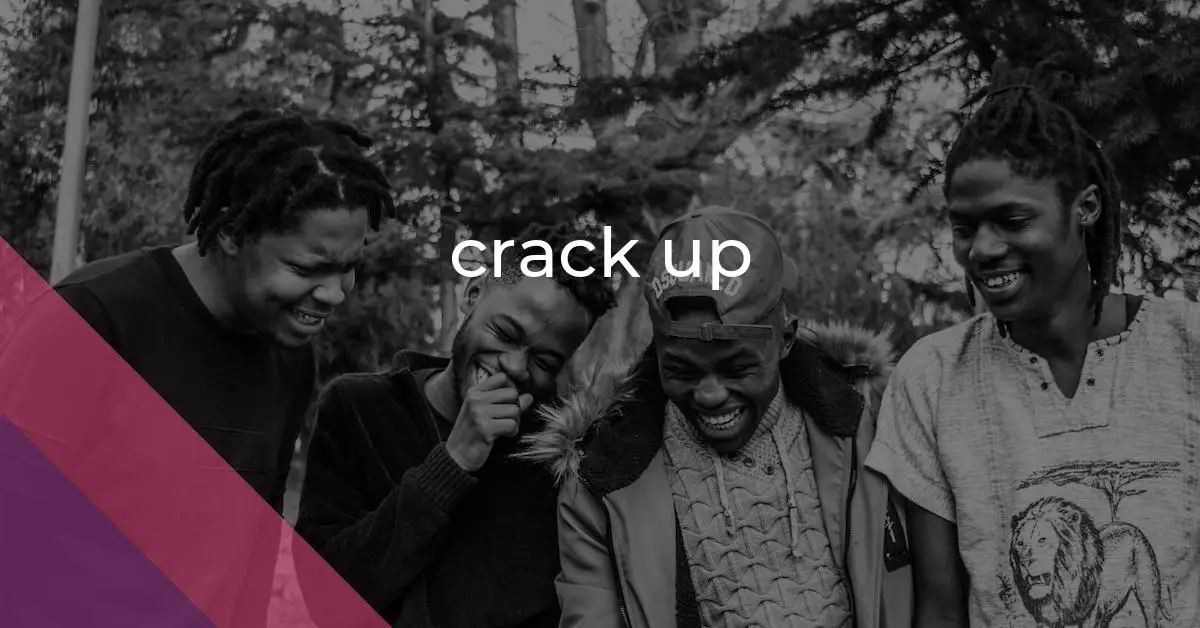crack up: Idiom Meaning and Origin
What does ‘crack up’ mean?
The idiom "crack up" means to burst into uncontrollable laughter or to mentally or emotionally collapse due to stress or pressure.

Idiom Explorer
The idiom "split one's sides" means to laugh uncontrollably or extremely hard.
The idiom "fall apart" means to lose control or fail dramatically. It is often used to describe a situation or person that is experiencing a sudden and complete breakdown.
The idiom "drive someone crazy" means to cause someone to become extremely annoyed, frustrated, or mentally unstable.
The idiom "cut up" means to behave in a silly or playful manner, often to make others laugh or entertain them. It can also refer to the act of criticizing or mocking someone in a lighthearted way.
The idiom "crap up" means to become messy or chaotic. It is often used to describe a situation or event that becomes disorganized or confusing. The phrase is informal and can be considered vulgar, so it should be used with caution in formal contexts.
The idiom "crack on" means to continue doing something with determination and without delay. It implies a sense of perseverance and focus in order to complete a task or achieve a goal.
The idiom "crack a smile" means to suddenly show a brief smile or to finally smile, often when one is feeling unhappy or trying to hide their emotions.
The idiom "crack a crust" means to break or open the hard outer layer or shell of something. It can also refer to a person who has a tough or unyielding exterior but shows vulnerability or softness underneath.
The idiom "come unhinged" means to lose one's emotional or mental stability, often resulting in erratic or unpredictable behavior.
The idiom "bust one's chops" means to criticize or tease someone in a harsh or relentless manner.
Unlocking 'Crack Up': Delving Deeper
Crack up is an idiom commonly used in American English. It can be used to describe situations or events that are unexpectedly funny or amusing, leading to a burst of uncontrollable laughter. Additionally, it can be used to describe someone who is experiencing extreme stress or pressure and is on the verge of an emotional breakdown.
One possible origin of the idiom "crack up" is the association between laughter and the cracking of one's voice or tone. When a person laughs intensely, their voice may break or crack, adding to the humorous effect. This connection between laughter and vocal cracking may have led to the usage of "crack up" to describe uncontrollable laughter. So when something is so funny that it makes you burst out laughing, you can say it cracked you up.
Another related idiom to "crack up" is "fall apart". When something or someone "falls apart," it means they are unable to cope with a situation and become emotionally overwhelmed. In a similar vein, when a person cracks up, they can be said to be falling apart emotionally. Both idioms describe a loss of emotional control and a breakdown in composure. So if something is so funny that it causes you to crack up, you might also say that it made you fall apart with laughter.
The idiom "crack up" can also be related to the phrase "crack a smile." When someone cracks a smile, it means they momentarily show a small smile or begin to smile. In the context of cracking up, this phrase can be used to describe a slight release of emotional tension while still in a state of uncontrollable laughter. It represents a momentary break from the intensity of laughter. So when something is so funny that it cracks you up, you may also crack a smile at the same time.
When it comes to cracking up, the phrase itself can be interpreted literally or figuratively. In its literal sense, "crack up" means to burst into uncontrollable laughter, just like a person may crack their voice when laughing intensely. In its figurative sense, it means to experience an emotional or mental breakdown, similar to when something falls apart. So crack up can refer to both laughter and emotional collapse, making it a versatile idiom.
The usage of "crack up" has evolved over time, from its association with vocal cracking in laughter, to its connection with emotional breakdowns and uncontrollable laughter in silent films. Today, the idiom is commonly used in casual conversations and informal settings to describe unexpected, humorous situations or someone on the verge of an emotional breakdown. It has become a well-known expression in American English, conveying both laughter and vulnerability.
Whether one is amusingly cracking up with laughter or emotionally falling apart, the idiom "crack up" encompasses various associations with uncontrollable expressions of emotion. Through its origins in vocal cracking and emotional breakdowns and its usage in describing unexpected humor and stress-induced breakdowns, this idiom provides a colorful and relatable way to express the complexity of human emotions.
Example usage
Examples of how the idiom crack up can be used in a sentence are:
- She couldn't help but crack up when she saw the funny video.
- His silly jokes always make me crack up laughing.
- The comedian's hilarious performance had the entire audience cracking up.
More "Humor" idioms



